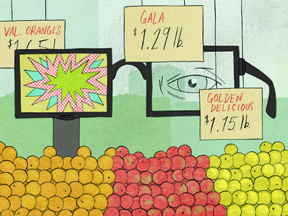Digital advertising is ubiquitous these days: You can watch TV on the subway platform, in the shopping mall and even in some elevators. And while you might not be aware of it, those TV screens are often watching you.
A company called CognoVision has developed software that analyzes the view seen by a tiny camera next to the screen. Developed by a U of T computer science grad, the software can tell how many faces are watching the screen, and for how long. It can also determine, with about 85 per cent accuracy, if the viewer is male or female, and can estimate their age – vital information for advertisers trying to reach a specific demographic.
The program can also change the ads on the fly in response to the audience, explains Shahzad Malik (PhD 2007), one of the three founders of the Markham, Ontario–based company, and the brains behind the software. “For example, if there are mostly women in front of a display, the software might choose an ad for cosmetics, while a male-dominant crowd could trigger an ad for a sports car,” he says.
CognoVision has also developed an overhead tracking system that uses ceiling-mounted cameras to monitor customer flow through retail spaces such as malls and grocery stores. The software can track the number of people that enter a store each hour, which parts of the store they go to and how long they have to wait at the checkout – information that owners can use to better organize their retail spaces.
Founded in 2006, CognoVision now counts the Canadian chains Whole Foods and Pizza Pizza among its clients. After significant startup costs, Malik says he expects the company to start showing a profit in 2010.
The technology may evoke Big Brother, but Malik stresses that the people the camera “sees” remain completely anonymous. “It doesn’t know whose face it’s looking at,” he says. “All it knows is, ‘that’s a face.’”
Watch a demonstration of how CognoVision’s system works:
Recent Posts
U of T’s 197th Birthday Quiz
Test your knowledge of all things U of T in honour of the university’s 197th anniversary on March 15!
Are Cold Plunges Good for You?
Research suggests they are, in three ways
Work Has Changed. So Have the Qualities of Good Leadership
Rapid shifts in everything from technology to employee expectations are pressuring leaders to constantly adapt







3 Responses to “ The Ads Have Eyes ”
CognoVision's new technology allows it to track how many pairs of eyeballs are looking at on-screen product ads. According to the story, the system can even make a stab at identifying the gender and estimated age of said eyes. This knowledge, which could enable a company to customize the products it shows according to the gender of the watchers, is not going to be Big Brotherly intrusive. At least that's what one of CognoVision's founders says. We'll see. It isn't too far from counting anonymous eyeballs to the chilling scenario depicted in the film Minority Report, where everyone's eyes were on file and known to every business - and, of course, the police.
Do we really want our every glance to be embraced by Coca-Cola and Harvey's and seen as an opportunity for them to make another buck? Even had Tom Cruise's character not been wanted by the police, he might still have wanted to swap out his eyeballs in exchange for a little privacy.
Geoff Rytell
Toronto
“The Ads Have Eyes” concludes by reassuring the reader that the technology being discussed observes us anonymously – those who gaze into our eyes without our knowledge or consent will never know who we are. Perhaps that is for the best. But they certainly know a lot more about us than we should be comfortable with! That brings little comfort for this “viewer.” In fact, it misses the point entirely.
By focusing on whether or not we are observed anonymously actually individualizes a problem by reducing it to whether or not a particular person’s identity is compromised. But it is our own collective identity that is at stake here! We may be anonymous as individuals, but we are certainly not anonymous as a society.
As companies find increasingly sophisticated ways to monitor, evaluate and respond to our behavior in order to increase the likelihood that we will buy a particular product or service, something fundamental about our freedom, integrity and value as human beings is compromised. Are we really free when we are so closely monitored?
This question is particularly pressing, considering that more money is spent in our society on advertising and marketing than on education – a point particularly relevant to a university facing hard times.
Trevor Norris
PhD 2008
This is awesome! Thanks stumbleupon.com!